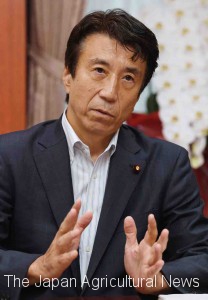TOKYO, Aug. 6 – Agriculture, Forestry and Fisheries Minister Ken Saito said in a group interview with The Japan Agricultural News and other media outlets that Japan will not easily respond to the United States’ request to review an emergency tariff imposed on U.S. frozen beef, nor start negotiating a bilateral free trade agreement. Saito also said he hopes agricultural cooperatives will work to support farmers adapt to the new environment.
Q. Looking back to what you have been working for, how do you feel about being appointed to the post of agriculture minister?
A. The goal was so far away and the path toward that goal was long and painful. Especially after I became the head of the Liberal Democratic Party’s Agriculture and Forestry Division, I was constantly faced with extremely difficult tasks. I was not a lawmaker with close ties with the agriculture industry. Agricultural cooperative reform was an inconceivably serious issue and I was responsible for that. I had been concentrating on tasks at hand and ended up here as a result.
Q. How are you going to respond to the United States’ demand that Japan review the beef safeguard tariff?
A. First of all, it is necessary to discuss the issue with the U.S. We decided on the safeguard measure as a substitute for tariff cuts, so logically speaking, if we are to revise the safeguard, we have to raise the tariffs back again. We must discuss such circumstances with the U.S. and ask for their understanding as much as possible. Since we have not even started talking about these issues, we are not thinking about revising the safeguard.
Q. Are you thinking about starting negotiations for a bilateral free trade agreement (FTA) with the U.S.?
A. I’m not thinking about that either. To start negotiations for the Japan-U.S. FTA means the U.S. will never return to the Trans-Pacific Partnership framework. Japan can’t simply allow that to happen.
Q. Does that mean the TPP agreement is better for Japan than the bilateral FTA?
A. Exactly so. The TPP framework is where Japan, which got a late start in the global trend of signing regional trade agreements, risked everything on one last throw of the dice. The agreement would create the world’s record largest economic bloc, offering more possibilities (also for Japan’s farm and marine produce) such as exporting marine products to Vietnam. It is far better than the (Japan-U.S.) bilateral agreement.
Q. How do you want agricultural cooperatives to proceed with reform?
A. Agricultural coops are autonomous organizations for farmers. I have nothing to say other than hoping they will work hard on activities for farmers. Farmers are in a situation where they have to try various new things. It is necessary to think whether there is an environment for them to do that freely and not to be hampered. I want agricultural coops to make efforts to help farmers adjust themselves to the new environment.
Q. What aspects will you focus on in coming up with measures to cope with the recently concluded Economic Partnership Agreement with the European Union?
A. We will definitely implement measures to stabilize businesses in sectors which will be affected by the agreement. At the same time, the EU is where washoku Japanese cuisine is popular. Since almost all of the EU’s tariffs on Japanese farm products will be abolished, we hope to implement measures to boost exports while clearing quarantine issues.


